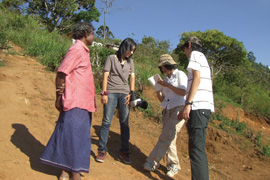The Mitsui & Co. Environment Fund
Introduction to Grant Projects
Rakuno Gakuen University
Conserving the natural environment of Boldoga Lake, Moratuwa, through the efficient use of sawdust being disposed of as industrial waste
Activity grant
- Project Description
Lake Bolgoda in Sri Lanka is a sight-seeing spot rich in ecosystems, but it is suffering from severe environmental degradation due to factors such as the destruction of mangroves, the inflow of industrial effluent, and sawdust dumping by sawmills. This project aims to reduce waste, provide an alternative source of firewood, conserve the environment, and sustainably develop the lumber industry through the effective usage of sawdust. This involves:
(1) Collaborating with local NGOs to research ecosystems and local societies, and formulating a masterplan to solve the problem
(2) Creating citizen, governmental, and NGO units to partner with lumber industry associations and share issues concerning waste disposal
(3) Introducing machinery that converts sawdust into wood briquets and charcoal, revitalizing the regional economy
(4) Implementing environmental education programs for local schools, collaborating to formulate action plans
- Fields
- Energy problemPreservation of biodiversity and ecosystem
- Grant year
- FY2008 Activity Grants
- Grant term
- 2 years
April 2009 - March 2011
- Grant amount
- 15,770,000 yen
- Activity region
- Indebedda region (Lake Bolgoda and surrounding areas), Moratuwa, Colombo District, Western Province, Sri Lanka

Overview of the Organization

- Representative
- Shinji Asada, Director
- Establishment
- 1993
- Establishment purpose
- Rooted in Christianity, tri-love is an educational method that encompasses love of God, love of humans, and love of the earth, and looks to cultivate healthy, decent young adults who can act on tri-love principles. The University provides education based of founder Torizo Kurosawa's educational theories and his principle that 'healthy land makes healthy people', and strives to create individuals that can apply creativity to practical tasks. Research and education is focused on the dairy industry, covering agriculture, food science, economics, veterinary medecine, food distribution, and environmental systems from the viewpoint of environmental conservation, including aspects such as agriculture in Japan, and the status of food staples, in order to contribute to development in these areas.
- Main areas of activity
- Activity is primarily carried out in Hokkaido, Japan, but also other countries such as India and Sri Lanka
- Staff
- 241 full-time staff members
- Annual operating budget
- 6.93 billion yen in 2007, 6.76 billion yen in 2008
- WEB site
- http://www.rakuno.ac.jp
- Recent activities
- Rakuno University's Resource Reuse Research Laboratory (Professor Shinji Asada) conducts various activities concerning the the use of reusable resources in Japan and developing countries under the founders motto of 'healthy land leads to healthy people'.
- (1) Addressing technical problems regarding the reuse of waste produced by food systems in Japan as fertilizer, and working with corporations to develop technology and create social systems
- (2) Researching agricultural waste problems and securing safe food and water in Asian countries such as India, and engaging with local people regarding environmental education.
- (3) Advancing technology that uses renewable energy in developing countries and regions (wind powered pumps for accesing underground water sources, solar cooking equipment, etc.) - Yoshio Oshitani Laboratory activity